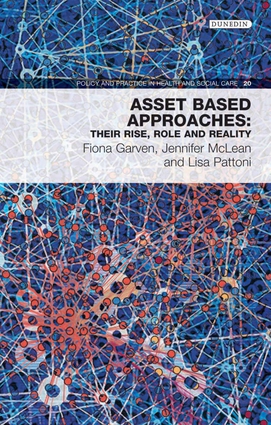
Sign up today...
for featured titles, special offers, bestsellers, and more, in your inbox!


Policy and Practice in Health and Social Care
POLITICAL SCIENCE
139 Pages, 8.5 x 5.43
Formats: Trade Paper
Trade Paper, $50.00 (US $50.00) (CA $47.00)
Publication Date: May 2016
ISBN 9781780460529
Rights: US & CA
To achieve a fair and just society with positive outcomes for all, there is an imperative to examine both the structural causes of poverty and inequality and the role that public services play in mitigating and reducing their impacts. A ‘deficit approach’ to the provision of public services has evolved in which services are designed to fill gaps and fix problems. This leads to individuals and communities becoming disempowered and dependent. An alternative lies in asset-based approaches. These change the relationship between the citizen and the state; between those supported by services and those doing the supporting. Asset-based approaches have implications for the structures and culture of public services.The debate is not confined to one specific policy area. The authors consider asset-based approaches as they are developing in Scotland from three broad perspectives: those of public health, community development and social services. They make the case that the fundamental principles underpinning asset-based approaches are common to all three areas and that they all share ambitions concerned with improving health and wellbeing, reducing the inequality gap and improving life circumstances for all.In providing a critical overview of the evidence for asset-based approaches, including the background and rationale for the approach; the current policy, political and economic context; and the implications and opportunities for the workforce, this book will be of interest and use to all those seeking change and improvement in the provision of public services whether from policy, practice or academic perspectives.
Fiona Garven is Director of the Scottish Community Development Centre (SCDC), which incorporates the Community Health Exchange (CHEX) and the Scottish Co-Production Network (SCN). She is the Chair of Community Development AllianceScotland (CDAS), a trustee of Irvine Housing Association and a non-executive director of North Ayrshire Women’s Aid. Fiona has specialist expertise in community development. Her main areas of focus are community engagement, building community capacity and community-led approaches to health. She has a background in community learning and development (CLD) and has many years’ experience of implementing community development approaches across several sectors. Fiona’s current work includes action research into asset-based approaches, support for community-led regeneration, democratic renewal and policy advice on community development approaches to public service reform. Her main interest lies in evidencing and profiling the benefits of community development methodology in order to create strong, healthy and equal communities.Dr Jennifer McLean is a public health programme manager at the Glasgow Centre for Population Health (GCPH), where she coleads a research programme exploring asset-based approaches andresilience for public health, with strong interest in the theory and evidence base underpinning the approach and asset-based working in community and healthcare settings. Jennifer is also the leadmanager for the pSoBid study, which explores the social, biological and psychological determinants of ill health in Glasgow, and also contributes to GoWell, a study of housing, health and regeneration in the city. Prior to taking up this post Jennifer worked at NHS Health Scotland in a national research management role and with NHS Ayrshire and Arran as a public health research officer followingthe completion of her academic career. She is also an honorary lecturer at the University of Glasgow.Lisa Pattoni is the Head of Innovation and Improvement at IRISS (Institute for Research and Innovation in Social Services). She has a wide range of interests around collaborative and co-produced methods of working and at IRISS her work involves supporting people to learn and reflect together, take risks and improve outcomes through the adoption or adaptation of new approaches. Lisa also currently serves on the Children’s Panel, which is a role she finds challenging and rewarding in equal measure. Her work often crosses the boundaries between academia, policy and practice, and prior to working at IRISS Lisa held and enjoyed roles in or influencing all these areas, mainly from within the not-for-profit sector. Communicating and interpreting ideas, policy and research have always been at the heart of her work.